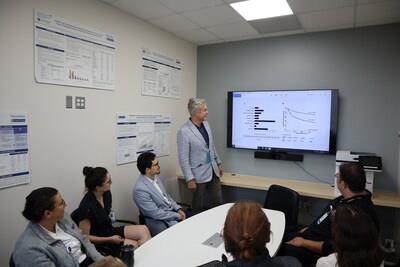(MENAFN- PR Newswire)
Risk Predication Tool, Developed by Anesthesiologists at Montefiore health System and Albert Einstein College Medicine, May Reduce Adverse Outcomes
BRONX, N.Y., Aug. 23, 2024 /PRNewswire/ --
A new computational risk assessment prediction tool developed by anesthesiologists at Montefiore Health System
and Albert Einstein College of medicine helps to predict who would benefit from
anti-blood clot
medications after non-cardiac surgery. The advance, published in Nature Medicine, could reduce the risk of atrial fibrillation (AF) and stroke.
Continue Reading

Dr. Matthias Eikermann, Francis F. Foldes Professor and Chair, Department of Anesthesiology, Montefiore Health System, Albert Einstein College of Medicine and research team.
Approximately 50 million patients
in the United States undergo non-cardiac surgical procedures annually, and it is estimated that up to one quarter of these individuals may experience new-onset post-operative atrial fibrillation (POAF), an irregular heart rhythm that can cause blood clots in the heart, increasing the risk of stroke, heart failure and other heart-related complications.
Montefiore researchers assessed the association of POAF and stroke in more than 250,000 patients who underwent non-cardiac surgery at Montefiore Health System in New York and Beth Israel Deaconess Hospital in Boston. While none of the patients had previously been diagnosed with atrial fibrillation, the researchers found that almost 5,000 patients had AF detected after surgery, and for those who received anticoagulation medications, their risk of stroke within one year after surgery reduced by half.
Existing guidelines do not provide strong recommendations on the prevention, detection and treatment of POAF. AF increases the risk of stroke by up to five-fold so improved diagnosis and treatment of POAF could substantially reduce incidences of stroke. Montefiore's new computational tool determines a patient's risk of developing POAF, based on nine factors, including age, sex and other existing health conditions.
"These findings have the potential to be practice-changing," said principal investigator Matthias Eikermann, M.D., the Francis F. Foldes Professor and Chair, Department of Anesthesiology at Montefiore Health System and Albert Einstein College of Medicine. "Right now, it is estimated that only one in three patients with POAF receive appropriate medications to prevent risk of AF and stroke. With the use of our computational risk assessment prediction tool and subsequent monitoring and treatment of high-risk patients, it is possible that far fewer people will experience adverse outcomes after non-cardiac surgery."
About Montefiore Health System
Montefiore Health System is one of New York's premier academic health systems. It is a recognized leader in providing exceptional quality and personalized, accountable care to approximately three million people in communities across the Bronx, Westchester, and the Hudson Valley. It comprises ten hospitals, including the Children's Hospital at Montefiore, Burke Rehabilitation Hospital, and over two hundred outpatient ambulatory care sites. The advanced clinical and translational research at its medical school, Albert Einstein College of Medicine, directly informs patient care and improves outcomes. From the Montefiore-Einstein Centers of Excellence in cancer, cardiology and vascular care, pediatrics, and transplantation, to its preeminent school-based health program, Montefiore is a fully integrated healthcare delivery system providing coordinated, comprehensive care to patients and their families. For more information, please visit
. Follow us on
Twitter , Instagram,
and
LinkedIn , or view us on
Facebook
and
YouTube
About
Albert Einstein College
of Medicine
Albert Einstein College
of Medicine
is one of the nation's premier centers for research, medical education and clinical investigation. During the 2023-24 academic year, Einstein is home to 737
M.D .
students, 209
Ph.D .
students, 124 students in the
combined M.D./Ph.D. program , and approximately 239
postdoctoral research fellows . The College of Medicine has more than 2,000 full-time faculty members located on the main campus and at its
clinical affiliates . In 2023, Einstein received more than
$192 million
in awards from the National Institutes of Health. This includes the funding of major
research centers
at Einstein in cancer, aging, intellectual development disorders, diabetes, clinical and translational research, liver disease, and AIDS. Other areas where the College of Medicine is concentrating its efforts include developmental brain research, neuroscience, cardiac disease, and initiatives to reduce and eliminate ethnic and racial health disparities. Its partnership with
, the University Hospital and academic medical center for Einstein, advances clinical and translational research to accelerate the pace at which new discoveries become the treatments and therapies that benefit patients. For more information, please visit
einsteinmed , follow
us on
Twitter ,
Facebook ,
Instagram ,
LinkedIn , and view us on
YouTube .
SOURCE Montefiore Health System
MENAFN23082024003732001241ID1108593711
Legal Disclaimer:
MENAFN provides the information “as is” without warranty of any kind. We do not accept any responsibility or liability for the accuracy, content, images, videos, licenses, completeness, legality, or reliability of the information contained in this article. If you have any complaints or copyright issues related to this article, kindly contact the provider above.